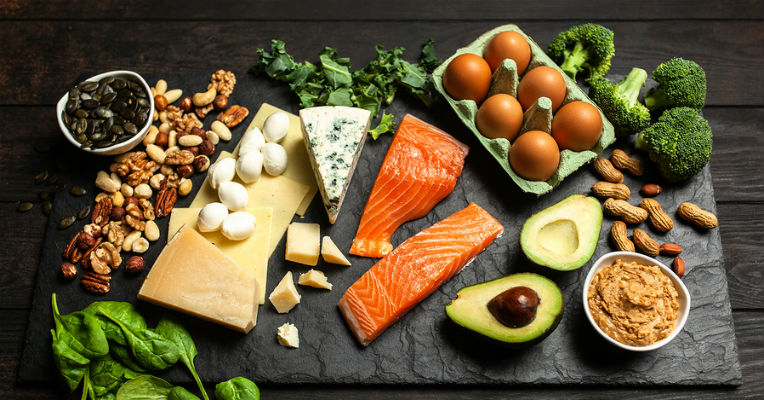Top 4 Reasons the Keto Diet and Bariatric Surgery are Not a Good Fit
The keto diet.
The keto diet involves slashing carbs (about 20 grams a day) and loading up on fat to get your body to enter into a state of ketosis. While in ketosis, your body breaks down both dietary and stored fat to use for fuel instead of carbohydrates.
The keto diet isn’t new. It is based on a diet used to reduce hard-to-control seizures in children. It’s been around as a weight loss diet since the Atkins diet in the 1970’s and has recently regained popularity.
The diet includes: High-fat meats, fish and poultry; oils and butter; high-fat dairy; and limited amounts of low carb vegetables. Fat makes up about 70% of the calories. Generally excluded are higher carb-containing veggies, fruit, breads, rice, pasta, or anything that boosts your carb intake above 20 grams.
Weight loss expected.
Recent studies suggest that the keto diet has some advantages for short-term weight loss. Studies on effective weight management and potential health impact from a high-fat, low-carbohydrate diet over a long time horizon are lacking.
Although there may be some short-term benefits to the keto diet, you’ll want to be sure to put a long-term strategy, such as the Barix Nutrition Guide, in place to help you maintain weight loss and overall health after weight loss surgery.
Other potential benefits.
Ketogenic diets may result in lower blood sugar, triglycerides, and blood pressure. High-density lipoprotein or “good cholesterol,” may increase. Keto diets can help treat epilepsy and are being researched for other neurological conditions, such as, Alzheimer disease and brain tumors.
Downsides.
Keto is not recommended for pregnant or nursing women or those with kidney, liver, or heart disease. Side effects could include dehydration, constipation, vomiting, kidney stones, and bone loss. More research is needed to assess the impact of the diet on long-term cardiovascular and microbiome health.
Ease of following.
This diet is very restrictive, but the high fat content should leave you feeling satiated. Cheese, bacon, butter, and cream lovers enjoy this diet, although their cardiologist might not approve. If you’re a fruit or sandwich lover, you’ll struggle.
Nutritional soundness.
The nutrition soundness of the keto diet relies a lot on the types of foods chosen. For example:
- Highly processed foods. It is possible to eat a diet of highly processed convenience foods that is technically keto, but obviously not very healthy. This diet could consist of frozen keto meals, keto chips, fat bombs, keto brownies, keto gummy bears, keto cookies, fried pork rinds, and the list goes on and on.
- A diet of quality unprocessed foods that includes vegetables, nuts, healthy oils, avocados, meat, fish, eggs, and cheese provides better overall nutritional soundness.
- A plant-based diet can also be modified with the use of plant-based proteins and supplements, healthy oils, nut, seeds, lower carbohydrate vegetables, and a small amount of berries.
When multiple food groups are restricted, as in the keto diet, nutritional deficiencies are more likely to develop. Careful planning and the use of vitamin and mineral supplements are recommended. Using an app to track your food intake can help to alert you to specific nutrients lacking in your diet.
Post bariatric surgery diet.
What if you’ve had bariatric surgery—is the keto diet an option? The diet following bariatric surgery initially focuses on obtaining adequate fluid and protein. This helps the body shed excess fat, but maintain maximum muscle tissue during the rapid weight loss phase. As the body heals, fresh unprocessed vegetables, fruits and whole grains are added. A diet of fresh, whole, unprocessed foods is encouraged. Six small (1/4 cup to 1 cup portions) protein rich meals are encouraged. Vitamin and mineral supplements are required to meet nutritional needs due to the small amount of food consumed.
The keto diet does not work well after bariatric surgery for the following reasons:
- The high fat content of the keto diet (70% of calories) does not allow for the consumption of adequate protein or carbohydrates.
- A high fat diet may lead to fatty diarrhea (steatorrhea) and reduced absorption of nutrients because food tends to travel faster through the intestinal tract after bariatric surgery. There is a risk for nutritional deficiencies after bariatric surgery; severely limiting specific food groups (whole grains, fruits, and many vegetables) only increases the chance that deficiencies will occur.
- Fat contains 9 calories per gram, while carbohydrates and protein contain 4 calories per gram—making fat a very concentrated source of calories. It is very easy to exceed calorie needs when consuming a high fat, low carb diet. Calorie intake 1 year or longer after bariatric surgery typically ranges from 800–1100 for women and 1000-1500 for men per day.
- The keto diet is low in fiber. This increases the risk of constipation, which can be a concern after weight loss surgery. Fiber may also reduce the risk of developing various conditions, including heart disease, diabetes, and diverticular disease.
Bottom line.
Although the keto diet does show some short-term promising results for weight loss, it is not a good diet strategy after bariatric surgery. A lifestyle that supports a healthy weight after bariatric surgery is something that can be followed life-long, with protein at the center of the diet. The keto diet with its extremely high fat content, very low carb content, exclusion of grains and fruit, and low fiber content are potential concerns for overall health. This is even more of a concern after bariatric surgery when portions are limited and nutritional deficiencies are a risk.


